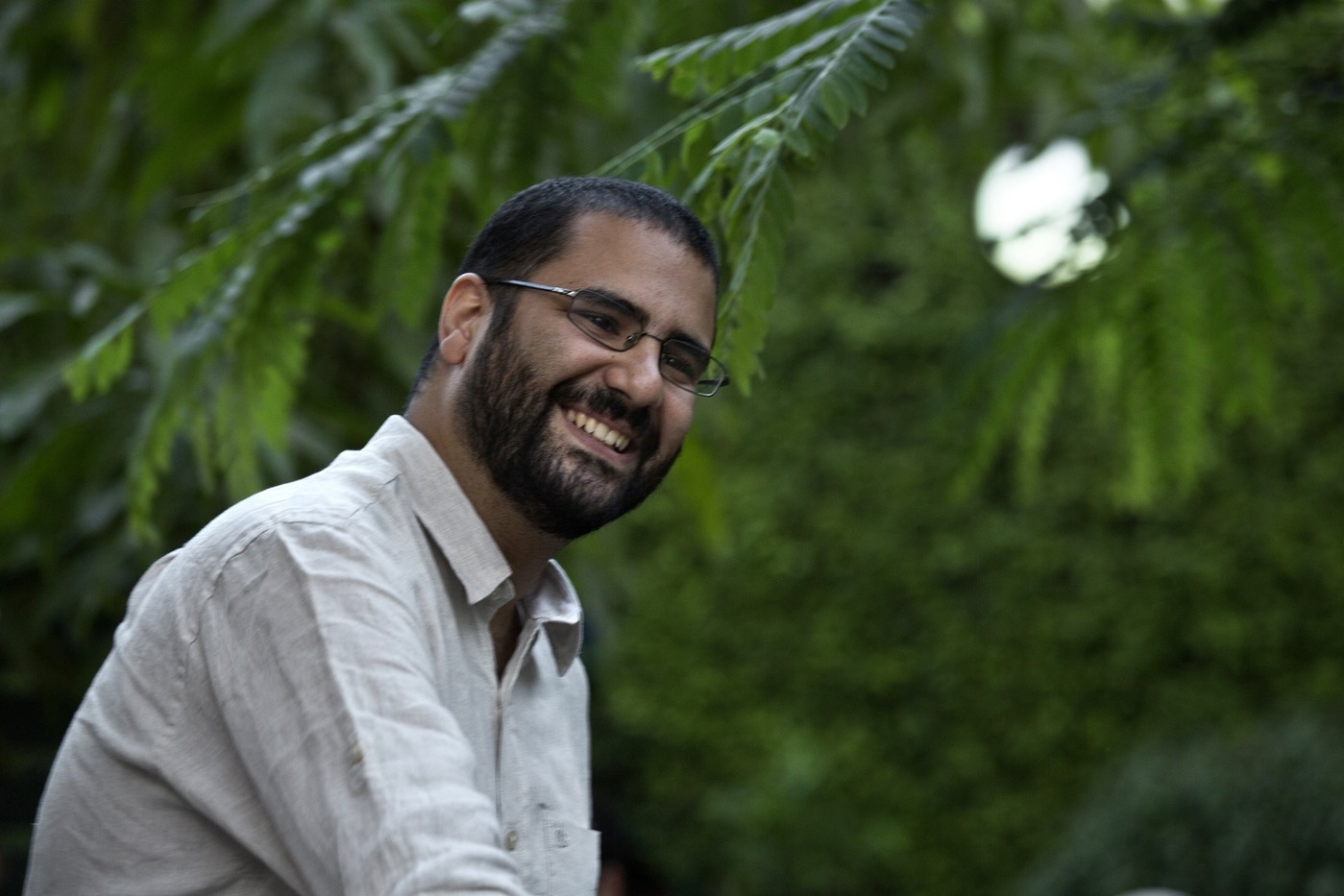
“From my mother, I inherited a stone cake, and, from my father, a prison cell.”
– From Graffiti for Two, by Alaa Abdel Fattah and Ahmed Douma
Known to many political activists across the Middle East, Alaa Abdel Fattah is an Egyptian political activist, software developer, and blogger.
Alaa first rose to prominence during 2006, when he was detained alongside a number of Kefaya protesters during a silent protest by almost one thousand Egyptian judges and hundreds of protestors. The judges and Kefaya members had organized a silent sit-in to call for the independence of the judiciary and their right to completely oversee elections. At the time, the (in)famous hashtag #FreeAlaa was first used, and it has been in continuous use for the last 15 years.
The young political voice, one of the few remaining in the country, spent the majority of the last decade in prison, serving time under every president in the last ten years. He continues to be incarcerated today after receiving yet another five-year sentence in December 2021.
The judges’ protests was the first of many large-scale demonstrations that led up to the 25 January Revolution, almost every single one of which Alaa Abdel Fattah – popularly referred to as Alaa – was present for.
However, that was not Alaa’s first act of disobedience.
In You Have Not Yet Been Defeated Alaa writes:
“I think back and find myself there, in the past, in the metro, with a friend, in my high school uniform, handing out an investigative report complete with photographs of the torture of an old ‘cattle thief ’ they set alight with kerosene in Fayoum police station. We change trains quickly before someone recovers from the shock of the image and arrests us. […]”
It is often forgotten that Alaa is a ‘techie’. Born in 1981, his teen years were in the late 90s, a time where the globalization of youth movements was at its starting point. Prior to present-day internet, users from across the globe would get on minimal forums and discuss their lives; many communities sprung up to focus especially on technology and social injustice in their respective countries, creating a whirlpool of shock and rage at the state of the world.
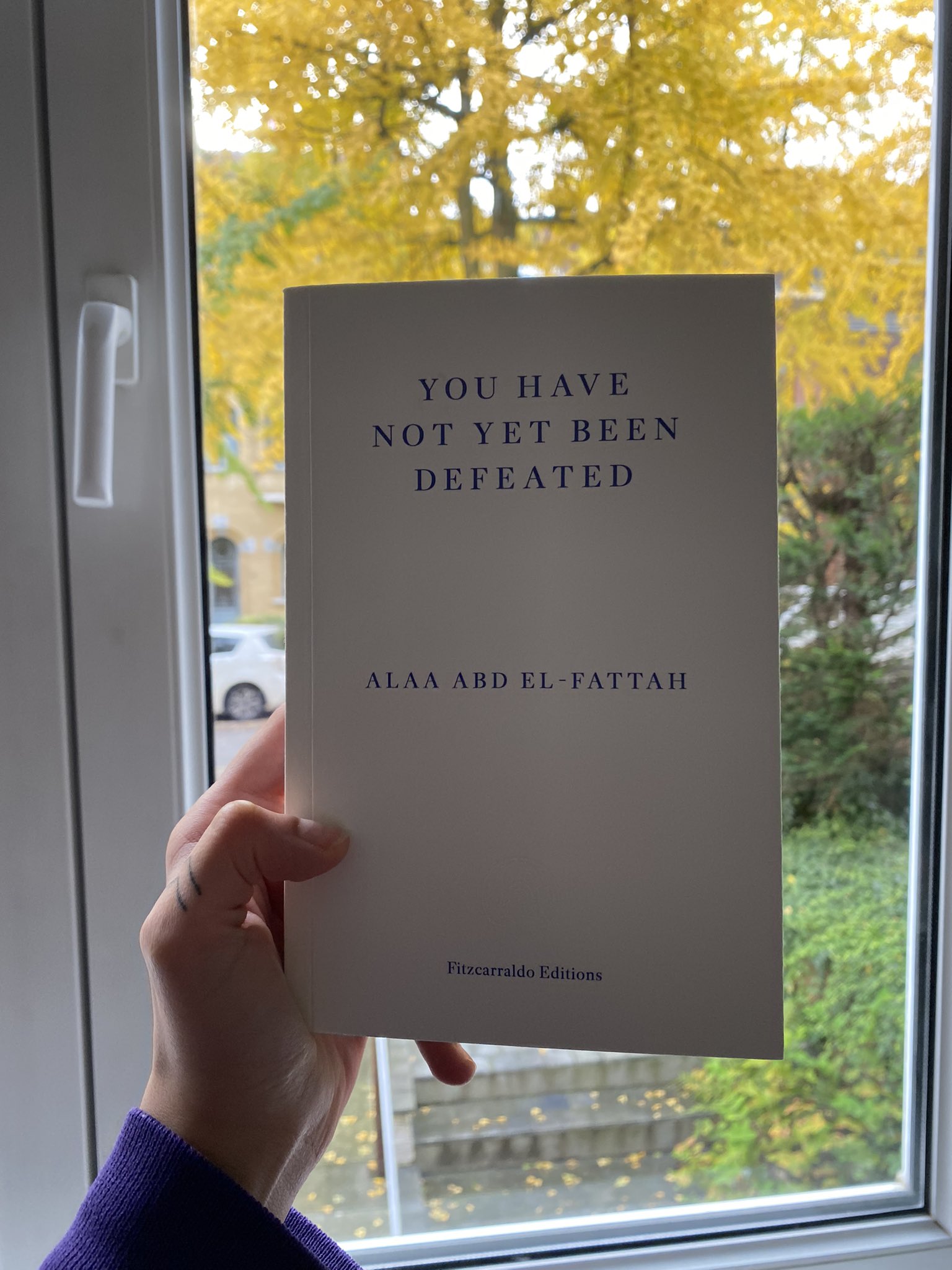
He is least known for his pen, yet Alaa’s ruminations have been captured in writing. Despite his reputation, his first book, You Have Not Yet Been Defeated (YHNYBD) is a collection of his writings and speeches between 2011 and 2021, compiled and translated by a group of anonymous supporters; it was published in the United Kingdom by Fitzcarraldo Editions in November 2021.
The book has been dubbed as ‘living history’ by Canadian author, activist, and filmmaker Naomi Klein. His writings and speeches, which comprise this collection, have mostly been smuggled out of prison in Alaa’s messy scrawl, documenting the most turbulent decade in contemporary Egyptian history. Some of the writings were originally published by leftist Egyptian newspaper Mada Masr.
The book is an amalgamation of blog posts, interviews, essays, social media posts, and Alaa’s public statements to the state prosecutor.
Content, structure and style
The book begins with a timeline of important events in contemporary Egyptian history, starting at 1952 and ending with 2021.
Over the course of 18 pages, a chronology of events is laid out, both objectively and occasionally punctuated with an important event in Alaa’s life. Alaa’s writing does not engage with Egyptian events in a vacuum but provides the entanglements of Egyptian history with the US, Palestine, and Israel.
Following that is an introduction to the text, written by Naomi Klein. The introduction, a makeshift short biography, provides context for Alaa’s life and how it is entwined with contemporary Egyptian politics. The remainder of the book is also structured chronologically, by year.
One example of the parallel development of Alaa’s life and conteporary Egypt can be given with Alaa’s article, Half an Hour with Khaled, which he wrote in prison during 2011; it was published in the same year in Al Shorouk newspaper. November of 2011 marks the Battle of Mohamed Mahmoud Street, three days of violence against civilians that left sixty dead and several thousand injured, many of which were left with permanent and life-changing disabilities.
During that time however, Alaa was in prison awaiting his trial in front of the State Security Prosecution in the Maspero case while his wife at the time, Manal, was nine months pregnant with their son.
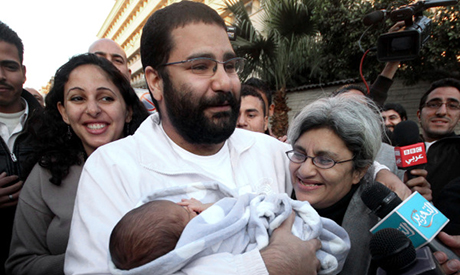
Alaa writes of the despair that he felt, realizing that his chances of being acquitted in time or allowed to leave in order to be there for the birth of his son were slim. Then, Khaled is born, named after Khaled Said (the Egyptian whose murder by the police in June of 2010 acted as a ‘spark’ for the 2011 revolution): he is set to be an immortal reminder of what the revolution stood for. Alaa writes:
“Then came Khaled! The next day I got a message saying him and Manal were healthy and well – and a photo. Love at first sight, love at first photograph. The prison and its walls and its cats all vanished, everything vanished except my love for Khaled and my joy at his arrival. I slept content. On his third day, Khaled visited me. It was a surprise. I assumed the doctor wouldn’t let him visit for at least a week. Khaled was with me for half an hour. I held him in my arms for ten minutes. […] Now I understand why I will resist: prison will not stop my love, my happiness is resistance, holding Khaled is continuing the struggle.”
The texts that make up You Have Not Yet Been Defeated are individual pieces strung together simply with the emotional intensity and powerful voice that could only belong to Alaa. There seems to be no rhyme or reason to the structure of the ideas presented, but that is due to two reasons.
The first is that the given timeline of contemporary Egyptian history ties things together with the given contexts, providing more of a ‘walk down memory lane’ feel that is more suited to the book itself. The second reason is that there are overarching themes that continue to appear as Alaa engages with the reader in each text, holding it together.
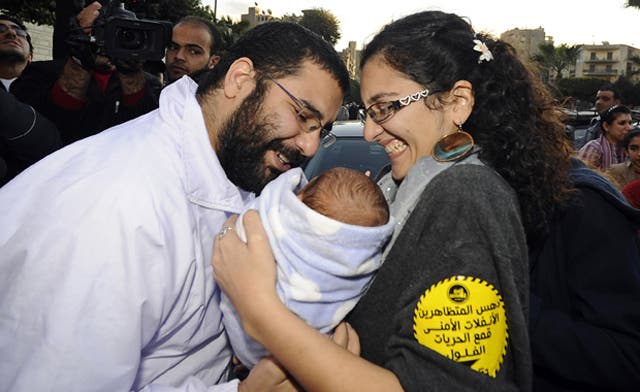
Alaa’s philosophies seep through and outside of his prison walls to engage with local and global issues with a startling genuineness and ingenuity. Perhaps, the book gives the impression that it is about Alaa himself, a self-centered account of his own experiences with the state, but that is not the case. Reading the book is companionable, with Alaa acting as a lens through which to look at some of the events that have transpired over the last decade, talking to the reader instead of at them.
Shortcomings
One issue that stands out with the book is the translation. Perhaps it would not if the reader was unfamiliar with Arabic or Alaa Abdel Fattah’s persona, but if a reader is familiar with both, there is a chance they will find that the translation falls short. Many of the published essays, as well as both blog and social media posts, were originally written in Arabic. Alaa takes the advice of leftist poet Ahmed Fouad Negm had to tell the people as well: “اكتبوا زي الناس ما بتنطق” (write as the people speak). Alaa is famous for his skill with prose.
Moreover, much of his writing is grounded in references that require background knowledge in either the language or the political connotations behind specific colloquial terms. While the translators have done a good job, no translation can truly do the original work justice. As a reader who is familiar with Alaa’s work, reading the translation was strange. However, that is a shortcoming that is associated with most, if not all, translated works.
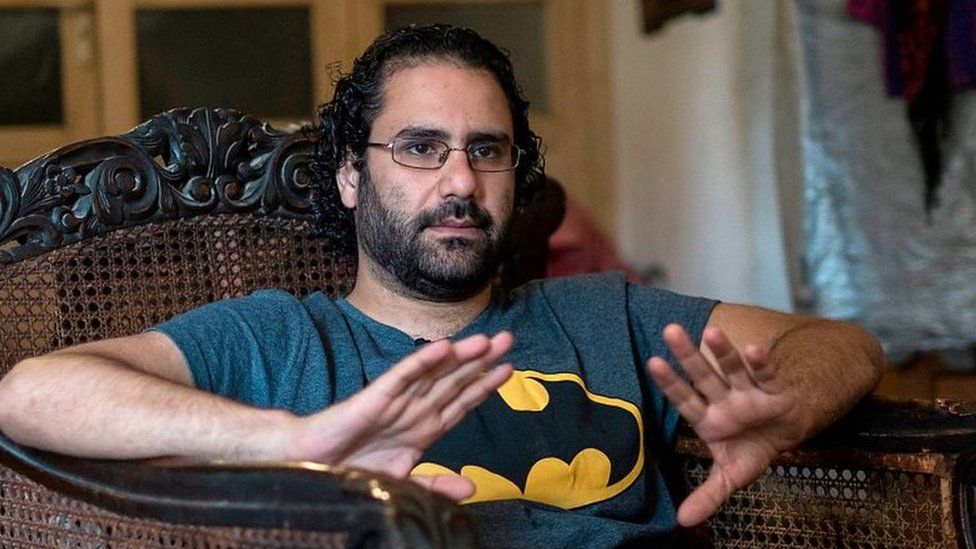
The main critique however, would be related to context. If a reader is already familiar with the last 70 years of Egyptian history and politics, then the book teaches them nothing new about either. The angle through which the events are described and engaged with is unique, but the knowledge of such happenings is not new.
Without a basic understanding of Egypt’s internal political climate in more recent years, it may be hard to fully grasp the relevance and profundity of the book. In such circumstances, attempting to read You Have Not Yet Been Defeated will be like jumping right into a niche without having a bird’s eye view. Thus, the question that poses itself is this: who is the intended reader, if there is one?
Takeaways
Alaa Abdel Fattah’s You Have Not Yet Been Defeated is a miracle in the same way Behrouz Boochani’s No Friend But the Mountains: Writing from Manus Prison is. Documentations of life in prison (open or closed) that come from within prison are always nothing short of extraordinary. In his article Graffiti for Two, which he co-wrote with fellow political activist and poet Ahmed Douma from inside of Torah Prison in 2014, they both write:
“We apologize to readers for any confusion or incoherences in the text – they’re due to the circumstances of its writing.[…] We tried in this text to express our gratitude to those who dispelled the loneliness of our cells with their love and their care, and our deep belief in a generation that refused to queue for a place at Authority’s table.”
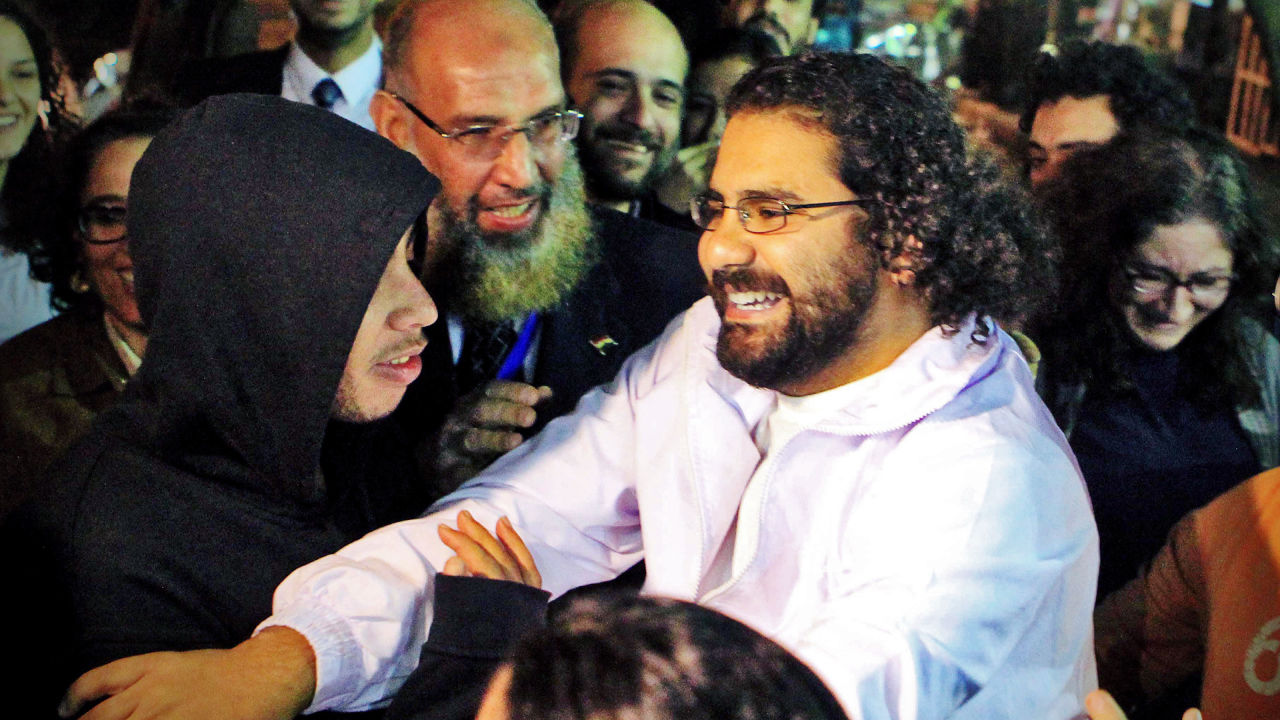
Alaa invites the reader to do two things in his book: to hold onto compassion, and to imagine. For someone who spent the better part of the last decade in prison to write an article on healing in 2019, at a police station for the comrades of his generation, is overwhelming.
Resistance is never framed in the usual set of despair and rage; there is no call to violent disobedience and no call to revolution. Instead, Alaa continues to affirm throughout the book that revolution is not the Square, revolution is the self.
To have faced as much cruelty as Alaa has and still embody and call for such an invitation for compassionate solidarity is a testament to his character. It also serves as a reminder that the rhetoric of rage does not allow space for conversation or compassion or redemption, and none at all for humanity.
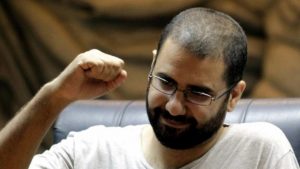
Alaa also invites the reader to imagine. How difficult must it truly be to imagine anything with the horrors he has written about having played out? How could anyone from “جيل الثورة” (the Revolution’s generation) still possess the ability? Better yet, how can he? Yet, he does.
Alaa’s questions are many, they fill up paragraphs in his essays, hundreds of characters lining up, only to be separated by question marks. It is a clear invitation to continue thinking, to never stop thinking, and to consider thinking and imagining as the most effective forms of individual resistance. As a reader from a younger generation, one that is two decades younger than Alaa’s, his questions were validating, empowering, and above all, thrilling.
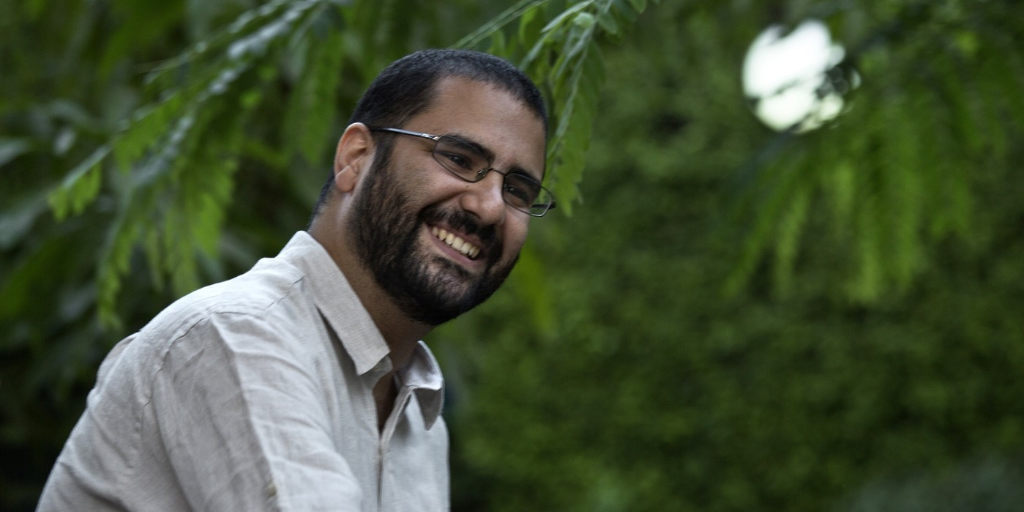





Comments (5)
[…] Book Review: Alaa Abdel Fattah’s Intimate Collection Carries Message of Compassion […]
[…] مراجعة كتاب: مجموعة علاء عبد الفتاح الحميمة تحمل رسالة … […]